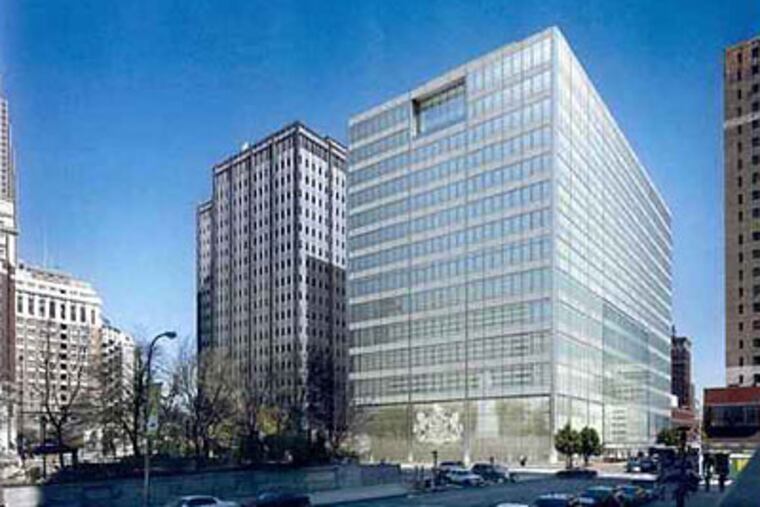FBI probes Family Court deal
The FBI has begun a criminal investigation into the botched deal to develop a Family Court building in Center City, according to sources familiar with the matter.

The FBI has begun a criminal investigation into the botched deal to develop a Family Court building in Center City, according to sources familiar with the matter.
The probe, still in its early stages, is examining $12 million in fees spent thus far on the project, without bids and without a final development deal, the sources said.
The payments were authorized by Supreme Court Chief Justice Ronald D. Castille, who has said that he approved the spending in a gamble to keep the $200 million project alive. Castille acknowledges having no idea where much of the money went.
Castille terminated the deal two weeks ago after The Inquirer reported that Jeffrey B. Rotwitt, a real estate attorney hired to represent the courts, ended up as a partner with the project developer.
The courts have already paid $1.3 million to Rotwitt's ex-firm, Obermayer, Rebmann, Maxwell & Hippel L.L.P. Rotwitt has said he received another $500,000 through his handshake arrangement with developer Donald Pulver.
The state has taken over the project at 15th and Arch streets, and Obermayer has fired Rotwitt, a partner who was the firm's biggest earner.
The Philadelphia Parking Authority, which owns the land, has canceled its development agreement with Pulver and moved to regain control of the site.
Rotwitt has hired attorney Catherine M. Recker, who frequently represents white-collar criminal defendants.
"I'm unaware of any investigation," Recker said Monday. "My client has done nothing wrong, and we welcome the opportunity to demonstrate that."
"We don't comment on potential investigative matters, even to confirm or deny their existence," said FBI spokesman J.J. Klaver.
Richard Barrett, chief of the corruption unit at the Philadelphia U.S. Attorney's Office, also declined to comment, as did representatives for Castille and Pulver.
One key question facing investigators: Who knew about Rotwitt's deal with Pulver, and when did they find out?
Castille has said Rotwitt kept him in the dark until the Inquirer first reported his role as codeveloper in April.
He said he was relying on Rotwitt's advice on what fees to pay Pulver and other consultants.
"That's why we had the guy," Castille said in an earlier interview. "He was an expert in real estate."
But Rotwitt insists that Castille, along with his partners in Obermayer, knew all about his arrangement with Pulver. Rotwitt said that he disclosed it two years ago, in a development proposal he sent to the courts. The document was never signed, and Castille said that it slipped by courts officials.
Since the deal was terminated May 26, lawyers for Castille have begun asking questions about how the money was spent.
Among the fees paid to Pulver were $1 million in so-called "land" costs, even though the Parking Authority wasn't charging anything for the development rights. Pulver said that money went towards paying off his past design costs and other expenses.
The courts paid $298,000 for real estate taxes since fall of 2008 - including a payment of $163,000 in the first month - when the taxes were only about $62,000 a year. A Pulver representative said part of the money went to pay back taxes.
Pulver's lawyers are now jousting over those fees with Ballard Spahr, the firm representing Castille.
Robert L. Ebby, a lawyer for Pulver, on Monday sent a letter promising an "accounting" of the $12 million, but did not set a date. A Ballard lawyer, Henry E. Hockeimer Jr., had demanded the answers by Monday.
In the letter, Ebby suggested that someone other than Hockeimer should audit the fees that Castille paid Ballard, about $500,000 to date.
Defense attorneys specializing in white collar crime said federal agents have a number of broad statutes that they can use as a basis to launch an investigation.
A federal antifraud statute can be applied in the case of a misappropriation from any agency that accepts federal funds. Another law popular with prosecutors forbids anyone from depriving the public of "honest services" on government contracts.
The U.S. Supreme Court is currently reviewing that law, but it remains on the books.
"It's still certainly ground for an investigation," said former federal prosecutor Rocco C. Cipparone Jr., a defense attorney in Haddon Heights.
Once an investigation starts, Cipparone said, they often shift directions as more evidence comes to light. "Things have a way of taking on a life of their own," he said.